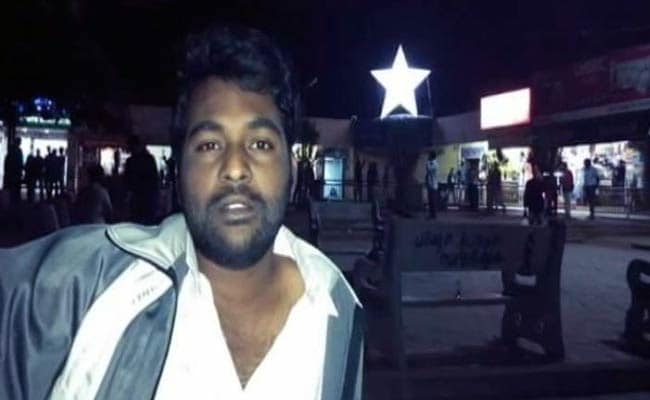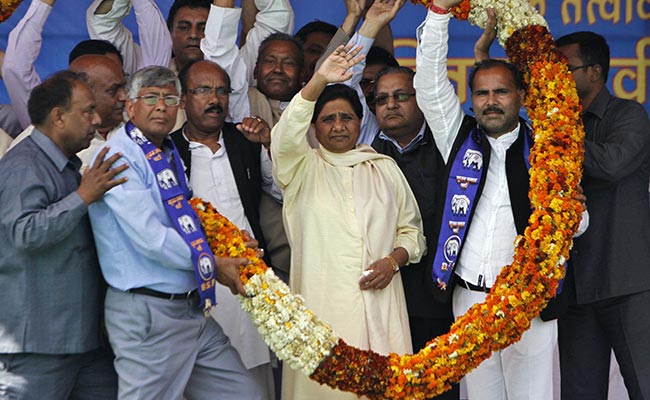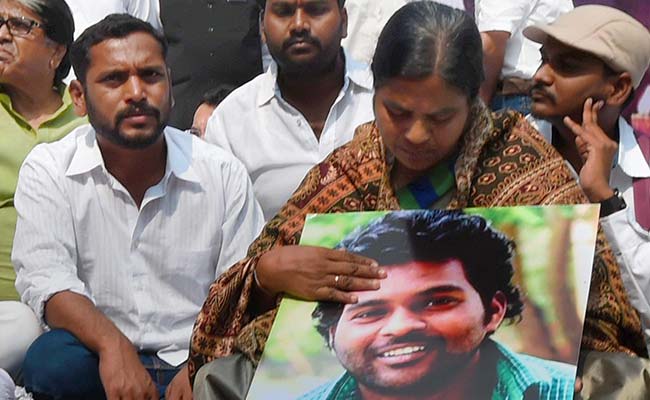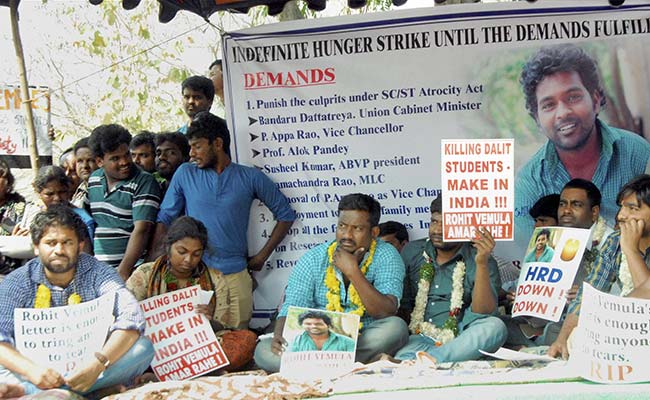
BSP chief Mayawati repeatedly blames the BJP government at the centre for Rohith Vemula's death
- PhD student Rohith Vemula killed himself last year on campus
- He was not a Dalit: recent order by Collector
- Mayawati accuses BJP of covering up caste atrocities
Did our AI summary help?
Let us know.
At a time when the BSP and the BJP are engaged in a bitter fight for the Dalit vote in the UP assembly elections, the collector's office in Guntur in Andhra Pradesh has declared that Rohith Vemula, who killed himself a year ago on campus, was not a Dalit, and recommended the cancellation of the Vemula family's Scheduled Caste status.
Since his suicide on January 17, 2016, the 26-year-old PhD scholar from Hyderabad Central University has become a symbol of resistance for young, educated Dalits across the country who regularly face some form of discrimination.
Twenty-seven year old Vivek, works in a chemist's shop in Lucknow; he is a Jatav - the dominant subset of Dalits in Uttar Pradesh. But while the elders in his family voted for Mayawati's Bahujan Samaj Party in the general election, he chose the BJP. "I thought if Narendra Modi could reach where he has after starting life as a tea seller, then I could also aim for more. I don't want to be a salesman all my life. But after Mr Vemula died, I asked myself why he was not allowed to fulfill his dreams: he wanted to be a scientist. Was it because of his caste?" Vivek has decided to return to the BSP this time round.
 In her campaign speeches, BSP chief Mayawati has been stoking this sense of despair facing young aspirational Dalits. Like Mr Vemula's mother, Mayawati, four-time Chief Minister, repeatedly blames the BJP government at the centre for Rohith's death. Radhika Vemula, says the young man was punished for challenging an oppressive caste system which could not tolerate his brilliance. Mayawati stresses in her speeches that the officials on campus sided with the ABVP, a youth wing affiliated to the BJP, after its members clashed with Dalit students including Mr Vemula.
In her campaign speeches, BSP chief Mayawati has been stoking this sense of despair facing young aspirational Dalits. Like Mr Vemula's mother, Mayawati, four-time Chief Minister, repeatedly blames the BJP government at the centre for Rohith's death. Radhika Vemula, says the young man was punished for challenging an oppressive caste system which could not tolerate his brilliance. Mayawati stresses in her speeches that the officials on campus sided with the ABVP, a youth wing affiliated to the BJP, after its members clashed with Dalit students including Mr Vemula.
He was suspended, and two weeks after he was forced to vacate his hostel as part of his punishment, he killed himself in a friend's room on campus.
In fact Mr Vemula's suicide is just one of the incidents targeting Dalits which have occurred since the BJP came into power in 2014, says Mayawati, who is trying to combine the Dalit and Musim vote, which add up to around 40% percent of UP, in her effort to dislodge Chief Minister Akhilesh Yadav and beat the BJP's campaign that's led by Prime Minister Narendra Modi. So, 61-year-old Mayawati refers to the burning alive of two children in Faridabad in Haryana by members of the Rajput community in October 2015, the public flogging of four young Dalit men by cow vigilantes in July 2016 in Una in Gujarat, and the abuse hurled at her by BJP leader Dayashankar Singh, which she successfully framed as an insult to all Dalits and all women. In these attacks, Mayawati has found a way of returning to the Dalit-Bahujan roots of the BSP which she had abandoned in the last few years by courting Hindu upper castes - replacing the Bahujan Samaj (refers to the weaker castes, adivasis and minorities) with Sarvasamaj (or all sections of society) - with disastrous results. Remember that in 2014, even the 55% Jatavs - her main support base - spurned her, with 16% percent of them turning to the BJP.
 The BSP sees a political conspiracy behind the timing of the order on Mr Vemula's caste. "It is an attempt to mislead UP's young Dalit voters who want justice for Rohith," insisted several party workers after hearing of the decision in distant Andhra Pradesh.
The BSP sees a political conspiracy behind the timing of the order on Mr Vemula's caste. "It is an attempt to mislead UP's young Dalit voters who want justice for Rohith," insisted several party workers after hearing of the decision in distant Andhra Pradesh.
Questions over Mr Vemula's caste were first raised by Smriti Irani, then Education Minister, within three days of his death. She claimed he was not a Dalit but an OBC (Other Backward Class, which places higher on the caste hierarchy), forcing his mother to reveal her personal tragedies to the world: that she had been abandoned as an infant by her Dalit parents, impoverished migrant labourers who left Mrs Vemula with Anjani Devi, a childless woman from the backward class Vaddera community, before moving on in search of work to another town.
Mrs Vemula never knew them and became aware of her Dalit roots years later, after a member of her adopted family hurled a caste abuse at her
She was married to Manikumar Vemula, also a Vaddera, whom she later divorced because of his abusive behaviour. She then worked as a housemaid and construction labourer before taking up tailoring to bring up her three children as Dalits.
 In an interview to NDTV on her son's first death anniversary, just weeks ago, she said, "I left my husband when my younger son was just two months old. For years, I struggled to raise my children. And I did it single-handedly. Their father never asked after them, or supported them financially or emotionally. He never bought Rohith or his siblings even a notebook or a pencil. He abdicated all his responsibilities towards them and yet today, the government is trying to establish they are more his children than mine. That only his caste defines their identity because he is their father, but not my caste. Where is the justice in this? Don't I have any rights in this country as a Dalit, as a woman and as a mother?"
In an interview to NDTV on her son's first death anniversary, just weeks ago, she said, "I left my husband when my younger son was just two months old. For years, I struggled to raise my children. And I did it single-handedly. Their father never asked after them, or supported them financially or emotionally. He never bought Rohith or his siblings even a notebook or a pencil. He abdicated all his responsibilities towards them and yet today, the government is trying to establish they are more his children than mine. That only his caste defines their identity because he is their father, but not my caste. Where is the justice in this? Don't I have any rights in this country as a Dalit, as a woman and as a mother?"
Mrs Vemula insists the government's only agenda in establishing an OBC identity for Rohith was to save its ministers from being prosecuted under the tough SC/ST act which provides imprisonment for committing atrocities against the weakest sections of society.
A retired Supreme Court judge appointed by the Centre to enquire into the "circumstances of Mr Vemula's death" also made his caste status it's main focus stating that Mrs Vemula faked her son's birth certificate to claim the benefits of reservation
It's not surprising then, to Mr Vemula's family, friends and supporters, that the Guntur collector should rule that he was not a Dalit. (Ironically, last year, while deposing before the National Commission for Scheduled Castes, the same Collector, Kantilal Dande, had stated that Mr Vemula was a Dalit).
 "The government is also trying to prove now that my brother committed suicide because he was fed up with his family," says Raja Vemula. (The former Supreme Court judge's report given to the Human Resources Development Ministry in August concluded that Mr Vemula did not face any discrimination at the university and was depressed for personal reasons, which finally pushed him over the edge.)
"The government is also trying to prove now that my brother committed suicide because he was fed up with his family," says Raja Vemula. (The former Supreme Court judge's report given to the Human Resources Development Ministry in August concluded that Mr Vemula did not face any discrimination at the university and was depressed for personal reasons, which finally pushed him over the edge.)
Despite being asked by several political parties to campaign for them in the UP elections, Mrs Vemula has been using other public platforms to demand justice for her son. She says she is reaching out "not just to Dalits, but all those who think of themselves as Dalits" - those who believe in equality.
In Marathi, the word Dalit means broken or crushed. Dr BR Ambedkar, towering Dalit icon, embraced it to describe the condition of his people. But in the 1970s, the definition of the term was expanded by the Dalit Panther party in Maharashtra to include women, Muslims, Adivasis and all other marginalised groups.
And it is this wider alliance that Mayawati is so desperately seeking to forge in UP, which the BJP seems equally determined to stop.
Since his suicide on January 17, 2016, the 26-year-old PhD scholar from Hyderabad Central University has become a symbol of resistance for young, educated Dalits across the country who regularly face some form of discrimination.
Twenty-seven year old Vivek, works in a chemist's shop in Lucknow; he is a Jatav - the dominant subset of Dalits in Uttar Pradesh. But while the elders in his family voted for Mayawati's Bahujan Samaj Party in the general election, he chose the BJP. "I thought if Narendra Modi could reach where he has after starting life as a tea seller, then I could also aim for more. I don't want to be a salesman all my life. But after Mr Vemula died, I asked myself why he was not allowed to fulfill his dreams: he wanted to be a scientist. Was it because of his caste?" Vivek has decided to return to the BSP this time round.

26-year-old Rohith Vemula killed himself days after he and four other students were suspended by the Hyderabad University and barred from its hostel last year
He was suspended, and two weeks after he was forced to vacate his hostel as part of his punishment, he killed himself in a friend's room on campus.
In fact Mr Vemula's suicide is just one of the incidents targeting Dalits which have occurred since the BJP came into power in 2014, says Mayawati, who is trying to combine the Dalit and Musim vote, which add up to around 40% percent of UP, in her effort to dislodge Chief Minister Akhilesh Yadav and beat the BJP's campaign that's led by Prime Minister Narendra Modi. So, 61-year-old Mayawati refers to the burning alive of two children in Faridabad in Haryana by members of the Rajput community in October 2015, the public flogging of four young Dalit men by cow vigilantes in July 2016 in Una in Gujarat, and the abuse hurled at her by BJP leader Dayashankar Singh, which she successfully framed as an insult to all Dalits and all women. In these attacks, Mayawati has found a way of returning to the Dalit-Bahujan roots of the BSP which she had abandoned in the last few years by courting Hindu upper castes - replacing the Bahujan Samaj (refers to the weaker castes, adivasis and minorities) with Sarvasamaj (or all sections of society) - with disastrous results. Remember that in 2014, even the 55% Jatavs - her main support base - spurned her, with 16% percent of them turning to the BJP.

BSP chief Mayawati is trying to combine the Dalit and Musim vote which add up to around 40% percent of Uttar Pradesh
Questions over Mr Vemula's caste were first raised by Smriti Irani, then Education Minister, within three days of his death. She claimed he was not a Dalit but an OBC (Other Backward Class, which places higher on the caste hierarchy), forcing his mother to reveal her personal tragedies to the world: that she had been abandoned as an infant by her Dalit parents, impoverished migrant labourers who left Mrs Vemula with Anjani Devi, a childless woman from the backward class Vaddera community, before moving on in search of work to another town.
Mrs Vemula never knew them and became aware of her Dalit roots years later, after a member of her adopted family hurled a caste abuse at her
She was married to Manikumar Vemula, also a Vaddera, whom she later divorced because of his abusive behaviour. She then worked as a housemaid and construction labourer before taking up tailoring to bring up her three children as Dalits.

Rohith's mother Radhika Vemula at Youth Congress protest against Union Minister Smriti Irani at Jantar Mantar (File photo)
Mrs Vemula insists the government's only agenda in establishing an OBC identity for Rohith was to save its ministers from being prosecuted under the tough SC/ST act which provides imprisonment for committing atrocities against the weakest sections of society.
A retired Supreme Court judge appointed by the Centre to enquire into the "circumstances of Mr Vemula's death" also made his caste status it's main focus stating that Mrs Vemula faked her son's birth certificate to claim the benefits of reservation
It's not surprising then, to Mr Vemula's family, friends and supporters, that the Guntur collector should rule that he was not a Dalit. (Ironically, last year, while deposing before the National Commission for Scheduled Castes, the same Collector, Kantilal Dande, had stated that Mr Vemula was a Dalit).

Members of the Students Christian Movement of India and other activists stage a protest in Bengaluru (File photo)
Despite being asked by several political parties to campaign for them in the UP elections, Mrs Vemula has been using other public platforms to demand justice for her son. She says she is reaching out "not just to Dalits, but all those who think of themselves as Dalits" - those who believe in equality.
In Marathi, the word Dalit means broken or crushed. Dr BR Ambedkar, towering Dalit icon, embraced it to describe the condition of his people. But in the 1970s, the definition of the term was expanded by the Dalit Panther party in Maharashtra to include women, Muslims, Adivasis and all other marginalised groups.
And it is this wider alliance that Mayawati is so desperately seeking to forge in UP, which the BJP seems equally determined to stop.
Track Latest News Live on NDTV.com and get news updates from India and around the world

